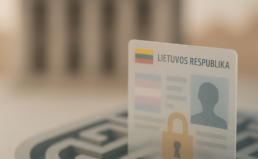On August 10th, 2018 following a series of arson attacks directed at the premises of the National LGBT* rights organization LGL and the apartment of its co-founder and Executive Director Vladimir Simonko, a wave of solidarity amongst the LGBT community in Lithuania emerged. As such, Romas Zabarauskas, an openly gay film director in Lithuania, had put up a rainbow flag in the balcony of his apartment in Vilnius. On September 2nd, 2018 just weeks after the incident at LGL office whose suspects were still not found, Mr Zabarauskas was woken up to the flames outside his doorstep. Refusing to file a possible anti-LGBT hate crime motive, the law enforcement officer instead suggested to “take off the flag before the whole house has burnt”.
Although it remains unclear whether the arson attack outside Mr Zabarauskas’ apartment is in any way related to those of last month, the pattern of similar arson attempts to sow fear amongst the LGBT community unravels, exposing inadequate response by the police. Mr Zabarauskas believes, that such statement reveals unwillingness and lack of competence of law enforcement officers to deal with possible hate crime incidents, which is why he shared the story on Facebook.
“LGBT activists are in danger,” says Vladimir Simonko, a co-founder and Executive Director of LGL. The situation, according to Mr Simonko, should not be dismissed as insignificant. “Today it’s the LGBT community. Tomorrow it might be another one,” fears Simonko.
According to the EU LGBT Survey, 39 per cent of the Lithuanian LGBT respondents were physically attacked or threatened with violence at home or elsewhere in the last five years. Despite the existent criminal law which explicitly prohibits hate crimes and hate speech on the grounds of sexual orientation, the lack of trust in law enforcement authorities and their subsequent reluctance to discuss and acknowledge specific needs for LGBT-related hate crimes victims in the course of criminal procedure provide for increasing levels of under-reporting. In 2016, according to the official statistics, only four cases of anti-LGBT hate crimes in Lithuania were registered by the police.
High levels of under-reporting are sanctioned not only by the inaccessibility of reporting centers, but also by the attitudes and beliefs of police officers who dismiss the sensitivity of anti-LGBT hate crimes and oftentimes disregard specific needs of LGBT victims. Following an attempt to set aflame the office door of LGL last month, the police officer went so far as to suggest the clothing store owner, with whom LGL shares the main entrance, to put up more signs indicating that it is a clothing shop.
The National LGBT* rights organization LGL conducts a series of trainings for police officers to effectively identify and investigate anti-LGBT hate crimes in Lithuania. Recently, it has published a handbook for victims outlining the rights and the course of action for anti-LGBT hate crime victims and aims to promote a UNI-Form app which helps to file a complaint to the police for a possible hate crime targeting LGBT people.
Lithuania remains one of the most hostile countries for LGBT people in Europe. According to Eurobarometer, only 14 per cent of Lithuanians would feel comfortable or indifferent with a same-sex couple of two men showing affection in public, which is the lowest result in the EU. The same number would feel comfortable or moderately comfortable if their children were in a love relationship with a transgender person. Such negative attitudes, along with political unwillingness to outlaw the ‘anti-gay propaganda’ law which indiscriminately censors LGBT-related positive information and other discriminatory legislation all reinforce social tendencies that discourage victims of anti-LGBT hate crime to report and law enforcement authorities to adequately respond.

![@[130078563815512:Augusto Didžgalvio fotografija]](https://www.lgl.lt/en/files/SIG-14960-356x237.jpg)


